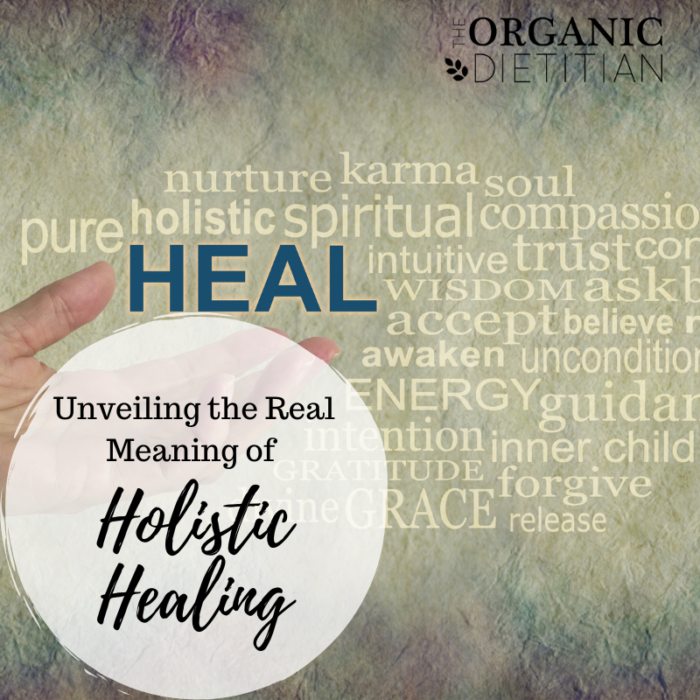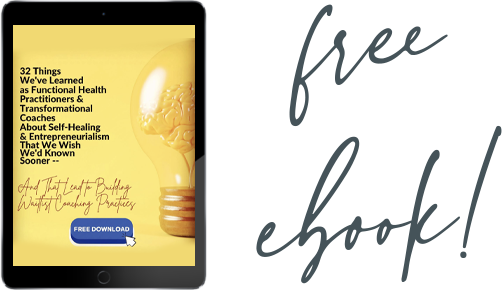1 December, 2024
Unveiling the Real Meaning of Holistic Healing

Holistic healing—it’s a term we see everywhere in the wellness space. It promises balance, health, and empowerment, but how often does it deliver on that promise? If you’ve been on a wellness quest, you may have experienced the frustration of practitioners and programs that claim to be “holistic” but leave you feeling stuck and unheard.
The truth is that the wellness landscape has evolved. Chronic health issues are more layered and complex than ever before, and traditional approaches, even “functional” ones, aren’t always enough to create real transformation. This is why a truly holistic approach is no longer optional—it’s essential.
But what does truly holistic actually mean? And why do so many approaches fall short?
As someone who’s been on both sides of the healing process, I get it. Like many of my clients, I’ve worked with practitioners who focused too narrowly—only on labs, biochemistry, supplements, or emotional energy work. They failed to connect the dots between physical health, emotional well-being, and the powerful influence of trauma on the body. That’s when I took matters into my own hands and redefined what truly holistic healing means.
Here’s what I’ve learned, and why I’m so passionate about sharing it with you.
What Makes Healing Truly Holistic?
The rise of the word “holistic” has been a double-edged sword. On one hand, it signifies a positive shift toward recognizing the interconnectedness of the body, mind, and spirit. On the other hand, the term is often used loosely, creating confusion and unmet expectations.
A truly holistic practitioner or coach operates from a comprehensive, integrative, and flexible approach. It’s more than a buzzword—it’s a philosophy rooted in honoring the complexity and individuality of each person. Here’s what sets truly holistic practitioners apart:
Balancing Physical and Emotional Health
True holistic healers understand the deep interplay between the body and mind. They don’t dismiss physical symptoms as “just stress” or treat emotional imbalances without addressing their physiological roots. They work with the bi-directional flow between both, creating balance and integration.
Recognizing the Role of Trauma
Trauma leaves imprints on the mind and body, influencing everything from immune function to chronic pain. A truly holistic approach weaves in psychoneuroimmunology (the study of the mind-body connection) and provides tools to address trauma gently and effectively. No piece of your wellness puzzle gets overlooked.
Related Blog Post: Unresolved Trauma: The Hidden Root Cause of Chronic Disease
Empowering Self-Healing
The best practitioners know that real transformation happens when you are empowered to take the reins of your own healing. They guide, support, and teach—but they also recognize that the ultimate healer is you. They act as an agent of change, helping you unlock your body’s innate ability to heal.
Harnessing the Power of Self-Efficacy
As the saying goes, “Give a man a fish, and you feed him for a day. Teach a man to fish, and you feed him for a lifetime.” People need to become empowered with the tools and knowledge to become their own healers. By fostering self-efficacy, a good practitioner helps you tap into your inner strength and wisdom, enabling you to navigate your unique healing path confidently and authentically.
Personalized Healing Plans for Long-Term Transformation
While personalized healing plans are important, true transformation happens when you are an active participant in the process. A skilled transformational coaching approach encourages you to explore and discover what works best for you, tailoring your healing journey to your specific needs and aspirations. By working co-creatively, a good practitioner helps you develop the skills and mindset necessary for long-term transformation and sustainable healing.
A truly holistic practitioner should honor your unique journey and believe in the power of your own healing potential. Together, you can unleash your inner healer and embark on a transformative path towards holistic well-being and self-empowered healing.
Working with the Whole Person
From your past experiences to your current habits, a truly holistic practitioner takes it all into account. They bring expertise in both physiology and psychology to address the root causes of imbalance—not just the symptoms.
Related Blog Post: Why People Don’t Heal from Chronic Illness Despite Huge Efforts
Adaptability is Everything
There’s no one-size-fits-all in healing. True holistic practitioners are continually growing, learning, and expanding their toolkit. Whether it’s integrating functional medicine, somatic practices, or energy healing, they meet you where you are and tailor their approach to your unique needs.
Coaching Leads the Way
Trauma-informed, transformational coaching isn’t optional—it’s essential. Coaching bridges the gap between clinical knowledge and the human experience, empowering clients to create lasting change. With the right coaching skills, a practitioner can guide breakthroughs that turn roadblocks into stepping stones.
Why Does a Holistic Approach Matter?
A truly holistic approach isn’t just about feeling better—it’s about becoming the best version of yourself. It’s about reclaiming your power, breaking free from patterns that no longer serve you, and stepping into a life of vitality and balance.
Imagine not just addressing hormonal imbalances or digestion issues but also understanding the emotional triggers behind them. Imagine learning to reprogram the impact of past trauma on your immune system. Imagine not needing an expert to tell you what’s wrong because you already know how to listen to your body. That’s the power of a holistic approach.
We believe this should be the gold standard in wellness. But unfortunately, it’s not what most people experience. Too many practitioners focus on fixing or prescribing rather than empowering. Too many overlook the importance of coaching and trauma-informed care. This is where the gap lies—and it’s a gap we’re committed to filling.
Telling clients what to do, whether it’s getting to bed earlier, dictating their diet, or suggesting meditation, can be just as limiting as prescribing supplements. The common thread in these approaches is that they focus on external directives rather than empowering individuals to embody the change they aspire toward.
At our core, we believe in a different approach—one that goes beyond surface-level instructions and empowers individuals to cultivate a deep understanding of themselves. We strive to guide our clients in uncovering their unique needs and desires, so they can create sustainable change from within. It’s about supporting them on a journey of self-discovery, helping them tap into their innate wisdom, and providing the tools and guidance they need to take ownership of their well-being. Together, we can bridge the gap between prescriptive wellness and authentic, empowering holistic healing.
Holistic healing is not just about following a set of rules or prescriptions. It’s about understanding yourself on a deeper level, uncovering your unique needs and desires, and learning how to create sustainable change from within. It’s about reclaiming your power and becoming an active participant in your own well-being.
So, if you’re ready to go beyond surface-level fixes and embark on a journey toward true holistic healing, find a practitioner who embodies these qualities. And don’t be afraid to ask questions and advocate for yourself along the way. Remember, this is your journey towards wellness.
The Wellness Revolution Starts Here
At its core, holistic healing isn’t about following a set of protocols. It’s about restoring connection—to your body, your mind, and your inner wisdom. Here’s the truth we live by:
- Healing isn’t prescriptive; it’s collaborative.
- Knowledge is power—but empowerment is everything.
- There is no “one way.” Every person deserves a customized path to wellness.
Our mission is to train practitioners who embody these principles, blending their clinical expertise with transformational coaching skills to guide clients toward breakthrough results. This isn’t just about fixing symptoms—it’s about helping clients thrive.
Is It Time to Redefine Your Healing Journey?
If you’ve been feeling stuck in your wellness path—or if you’re a practitioner looking to offer deeper, more meaningful transformations for your clients—it might be time to explore what a truly holistic approach could look like for you.
We’re here to help you unlock the tools, strategies, and mindset for lasting health and vitality. Because the real meaning of holistic healing is more than a term—it’s a way of life.
Are you ready to take the first step?















 80% of chronic dis-ease is rooted in stre
80% of chronic dis-ease is rooted in stre
 As
As 
